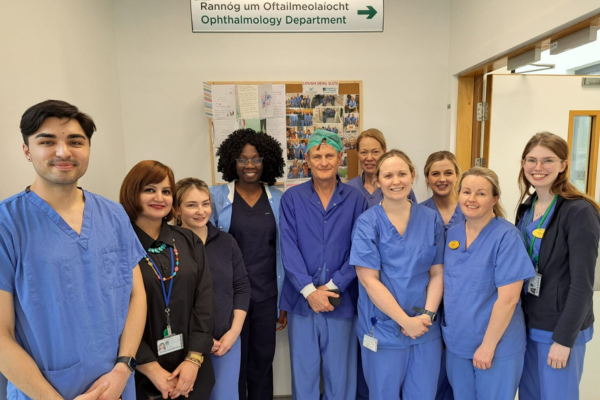Nenagh Hospital dramatically reducing surgical wait times for cataract outpatients

- More than 40% of patients have surgery within a month of consultation
- 90% of patients undergoing surgery within four months
- GP-referral Dedicated Cataract Clinic is only one of its kind in Ireland
NENAGH ¦ 08-03-2024: THE DEDICATED Cataract Clinic (DCC) for ophthalmology outpatients at Nenagh Hospital has emerged as a leading centre for cataract surgery pre-assessment, with more than 40% of patients having surgery within a month of consultation, and 90% undergoing their operations within four months
A GP-referral service, and the only one of its kind in Ireland, the DCC was established in July 2022 at the hospital’s modern Lough Derg suite alongside five other eye clinics (laser, intra-vitreal injections, post-operative review, pre-op assessment, and a day clinic for routine appointments).
The DCC runs twice monthly, each appointment providing patients with a consolidated, comprehensive range of tests and examinations—including consultant appointment—that traditionally would have required multiple visits.
“We’re very excited about what we’re providing for our patients, which is revolutionising patient care while reducing waiting times,” said Adebusola Owokole, Perioperative Clinical Nurse Manager (CNM2) in the Ophthalmology Department.
She added: “The DCC has brought together and streamlined processes into a single-day, single-location service that raises the standard of surgical pre-assessment excellence, improves the wait time for surgery, and helps ensure a satisfactory outcome.”

Members of the DCC team at Nenagh Hospital – from left, standing: Rachel Gleeson (Healthcare Assistant), Caroline Larkin (Secretary), Dr Mohammed Mohamed (Senior Registrar), Dr Ray Abbas (Senior House Officer), Adebusola Owokole (CNM2), Rosario Cahir (Secretary), Aoife Lynch (Optometrist), Bessy Kuriakose (Staff Nurse), Amy Ryan (Staff Nurse), and, front right of group, Louise McGeehan (Staff Nurse) and Susan Hegarty (Staff Nurse).
Led by Consultant Ophthalmologist Mr Conall Hurley, the DCC’s multidisciplinary team includes a senior medical and nursing staff, an optometrist, healthcare assistants and administrative support.
In its first 12 months, up to July 2023, the DCC organised a total of 23 clinics, seeing approximately 12-15 patients per clinic.
Of the 253 patients who attended, 27 were not called for surgery, and 203 (89.8%) had their surgery within four months. Of these patients:
- 43.7% had surgery within 1 month of DCC appointment:
- 20.3% - within 1-2 months
- 25.7% - within 2-3 months
- 10.3% - within 3-4 months
The remaining 23 patients had surgery in more than four months, with the most common reason being delayed anaesthetic pre-assessment, highlighting an area for potential process improvement that has since been solved by providing anaesthetic pre-assessment on the same day of the clinic.
Prior to the implementation of the DCC Model, most cataract patients had average wait times of two to four years for the procedure. Since the opening of the stand-alone, high-volume, consultant-led DCC in Nenagh in July 2022, the total number of patients waiting for a procedure has reduced from 647 to 131. The number of patients waiting longer than 12 months has decreased from 134 to just 10 and the average wait time for patients on the day case waiting list has reduced to four months - and continues to fall.
Ms Owokole says the comprehensive single-appointment process has earned the DCC a unanimously positive reaction from patients. She revealed that recent surveys have delivered a 100% satisfaction rating among respondents.
“The streamlined patient journey encompasses various medical aspects and education components, which ensures a thorough, efficient experience, and ultimately contributes to the overall wellbeing of our patients,” she said.
At a typical visit, the patient’s journey begins with checks on vital signs and electrocardiogram (ECG) examinations, before progressing to visual acuity and biometry tests with our dedicated nursing staff and Registered/Certified Advanced Nurse Practitioners. The next stage involves a detailed consultation with consultant ophthalmologist Mr Hurley, who thoroughly reviews the data gathered and consults with patients to developed tailored treatment strategies. The next stage in the process is the cornerstone of the clinic’s diagnostic approach, an Optical Coherence Tomography (OCT) examination utilising advance imaging technology to deliver intricate visual imagery that empowers the team to make the most important decisions for patients. A second consultation with Mr Hurley follows to finalise a tailored, individualized treatment plan for each patient.
Patient education is a particularly important element of the DCC service, and the team members impart vital information to all patients during their appointments, using audio-visual aids to inform them about the steps involved in their surgery, and advising them on what they should bring to hospital on their morning of their procedures. In cases where specific medical concerns are a factor, including patients with cardiac or respiratory considerations, an anaesthetist will be notified to provide an additional review.
Consultant Ophthalmologist, Mr Conall Hurley, explained that the DCC service was set-up in July 2022 with a view to streamlining the cataract service. “The design of the clinics purposely amalgamated three visits into one, thereby making the preparation for cataract surgery much smoother for the patients and reducing workload for staff. The design also facilitated the more rapid delivery of the surgery than had been the case for many years heretofore. A recent audit has clearly demonstrated that the intended efficiencies have been delivered to date. We will continue to strive to maintain the pace of delivery whilst also continuing with a rolling audit cycle in order to ascertain if further efficiencies can be incorporated into the DCC service.“

